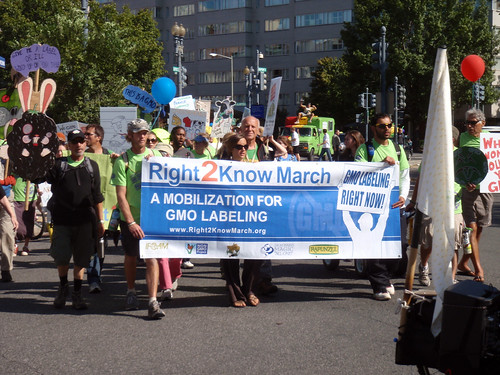May 2012
In 1998, the EU
responded to its citizens demands and instituted mandatory labelling
of GM foods. At the time, Monsanto's PR department carried out the
best damage-limitation exercise it could by claiming to agree that
“You have the right to know what you eat, especially when it's
better ... We believe that
products that come from biotechnology are better and that they should
be labelled”.
 |
| GMO Right2Know march in the USA. Photo Daquella manera on Flickr |
Europeans'
right to know what they eat, however, wasn't extended to the animal
products from livestock fed GM feed. The result has been that honest
information about the main source of GM in our food chain remains
dependent on the integrity of individual food suppliers and is,
therefore, patchy.
In
the USA, the Food and Drug Administration (FDA) can require labelling
of GM foods only if they are considered materially different from
their conventional equivalents. What this means in practice is that
labelling will only ever happen if the biotech industry comes up with
a value-added GM product for which a label will, usefully, broadcast
the 'benefits'. Because the FDA has no budget for safety-testing,
there's zero possibility of labelling on safety grounds. Neither has
the FDA any authority to require labels just because a food has GM
ingredients nor because US citizens want them: effectively, Americans
have a zero right to demand labelling and zero right to know.
This
situation is trying to change. In the last few months, GM labelling
initiatives have been launched at all levels of administration in the
US.
The
Center for Food Safety is challenging the FDA's attempts to duck
responsibility: in its view the Administration has not only the
authority, but has a statutory duty to require labelling.
'Right-to-know'
labelling bills have been drafted in several States as a result of
record-breaking public support. In Vermont for example, surveys have
shown a minimum of 94 % of Vermonters want GM foods to be labelled,
and a petition to pass a labelling bill was signed by 4,001 people in
this small State in only two months.
Besides
the State of Vermont, California, Connecticut, Washington State,
Minnesota and Hawaii have 'GM right-to-know' bills in the pipeline.
Congress
has been presented with 'HR3553 The Genetically engineered Food Right
to Know Act' for consideration. This Act would require GM food to be
clearly labelled. It would also require the FDA to periodically test
products to ensure compliance. The Congressman who introduced this
legislation explained:
"industry has resisted objective study of the issue. To this day, biotechnology companies are largely allowed to self-regulate. Enough is enough. The American people are demanding a right to know. My legislation puts the onus on Congress to be responsive to the will of the people. It gives the power to consumers to make an informed choice about the products they consume".
On
the down-side, there are so many stages that new Bills have to pass
through to become law, they have a habit of stalling in committee.
Also, regulators are facing the wrath of a very jittery biotech
industry. A lawyer who has represented biotech interests warned the
Vermont Agriculture Committee and one of its attorneys that the State
would face a lawsuit from the industry if it passed its Bill. One
Committee member said dismissively “We knew from the get-go that
any meaningful bill would be subject to a lawsuit”, but at the
moment nothing seems to be happening in State Houses in Vermont nor
anywhere else.
While
Americans are struggling to get the most simple information about the
GM nature of all
their food, and Europeans are still struggling to get the most simple
information about the GM nature of the feed used to generate animal
food products, Turkey is not struggling. The Turkish Minister of
Agriculture has just extended labelling rules to cover products from
animals fed GM feed. Campaigners in the area said:
“With this announcement our minister not only filled a legal void, but also showed that we can be a leader in the region and the European Union”.
OUR COMMENT
Fifty countries already require some sort of GM labelling, and Turkey
has handed its citizens full control over their choice of food.
America, it seems, is going to be left behind.
There
may be stalling in the law-making process, and threats from industry,
and probably law-suits to be heard, but with this kind of public
pressure building up, one State will pass a right-to-know law and
when the flood-gates open, all Americans will get GM labels on their
food.
No
doubt when this happens, Monsanto will fall back on a declaration
that GM should be labelled because it's better, even after the
Company has been a party to suing every State which required honest
labelling of GM foods.
SOURCES:
- GMO label movement faces hurdles Vermont, Burlington Free Press, 23.04.12
- Vermont Right to Know GMOs hosts an unlabeled and unnatural buffet at the Vermont State House, VT Digger, 11.04.12
- Carl Etnier, Scores testify in favor of GE food labeling bill, VT Digger, 12.04.12
- GM Food Labeling News, The Organic & Non-GMO Report, Issue 119, December/January 2012
- GMO labels for products coming, Hurriyet Daily News, 19.04.12
- Outrage! Organic Consumers Association, Organic Bytes, 3.05.12
No comments:
Post a Comment
Thanks for your comment. All comments are moderated before they are published.